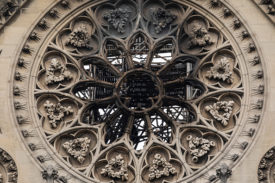By Christopher White, The Tablet’s National Correspondent

NEW YORK – One month after a massive fire ravaged Paris’s Notre Dame Cathedral, one of the most iconic landmarks of western civilization still stands, but controversy lingers as restoration efforts are now underway.
To date, more than one billion dollars has been pledged to rebuild the historical cathedral, with individuals such as French millionaire François-Henri Pinaul pledging gifts of over 100 million dollars. Last week, Paris Archbishop Michel Aupetit said that the Foundation of Notre Dame, as well as the Diocese of Paris, continue to accept donations as the needs are “far from finished.”
President Emmanuel Macron – who just days after the fire said he’d like the rebuilding to be complete in five years, before the city plays host to the summer Olympic games in 2024 – kicked off an international competition for plans to redesign the cathedral’s roof, which was devastated in the fire.
Notre-Dame was nationalized in 1789 during the French Revolution, and remains the property of the French state. By law, the Catholic Church has exclusive use of the building, but the government covers the cost of building maintenance and repairs.
Last week a bill made its way through the National Assembly, France’s legislative body, put forward by La République En Marche(LREM), Macron’s party, which has garnered criticism from its own members, the opposition, and especially art historians and preservationists.
The bill has a stated aim “for the restoration and conservation of the cathedral and establishing a national fund for this purpose.” In its current form, it would allow for up to 75 percent of donations toward the efforts to be tax deductible and would allow state authorities to manage the worksite, construction, and preservation initiatives, with the president of the French Republic granted wide ranging executive decision-making power.
Much of the controversy centers on whether the funds will be used to restore the cathedral to its original design or if it will entail a complete redesign, or at a least a modified one.
During a lively, 13-hour debate among assembly members, one member of parliament, Guillaume Larrivé, spoke of the need “to guarantee that the intention of the President of the Republic is to use his hand to shape the cathedral Notre-Dame de Paris.”
Many have expressed concern that Macron could make the cathedral’s rebuilding a personal vanity project, over national interests.
Others decried the speed in which the reconstruction efforts are moving forward, and another assembly member accused the government of trying to thwart or supersede French and European laws on “heritage, the environment or urban planning.”
Preservationists and heritage experts have criticized the law, with 1,170 specialists signing a letter to Macron, which was published in Le Figaro last month.
“We are against the very principle of an exceptional law,” said Alexandre Gady, an art historian at the University of the Sorbonne and President of the Association for the Defense of Heritage Sites and Monuments, making a case against the fast-tracked process put forward by Macron.
“As Tacitus says, ‘the Republic is corrupt when laws multiply.’ There is no justification for this law, which takes the restoration of Notre Dame out of the normal framework. The use of orders and derogations sets a dangerous precedent, when we already know how to move quickly within the framework of existing law,” he continued.
According a poll conducted by YouGov from Le HuffPost and CNews, 54 percent of French adults seek to restore the cathedral to its original form, with another 25 percent seeking a modern addition. 21 percent of respondents did not have an opinion on the matter.
In response, France’s minister of culture, Franck Riester, vowed transparency in the process.
The people “will be able to express themselves,” he said in an interview with LCI Television. “Then we will decide after a great debate and great consultation.”
